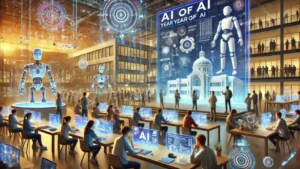AICTE to Integrate AI into Core Engineering Branches’ Curriculum by 2025
AI Revolution in Engineering is on the horizon as the All-India Council for Technical Education (AICTE) takes a groundbreaking step to integrate Artificial Intelligence (AI) into the curriculum of core engineering branches by 2025. This visionary initiative is designed to modernize traditional engineering disciplines, equipping students with future-ready skills to thrive in an increasingly technology-driven world. Declaring 2025 as the “Year of AI,” AICTE underscores its dedication to building an AI-empowered workforce that meets the dynamic demands of the global industry.

A Bold Step Towards the Future of Engineering
To prepare engineering students for the challenges of tomorrow, AICTE has begun integrating AI into the curriculum of various engineering streams, starting with the undergraduate Electrical Engineering program. This pilot initiative will serve as the blueprint for introducing AI into other essential engineering disciplines like mechanical, civil, and electronics engineering. By 2025, AI will be embedded into the syllabus of all core branches, marking a significant leap in India’s higher education sector.
Multidisciplinary AI Modules for Engineering
AICTE Chairman, TG Sitharam, confirmed that multidisciplinary AI modules would be added to the core engineering curriculum as part of the modernization process. These modules will cover a range of topics, from basic AI concepts to advanced machine learning applications in engineering. AICTE’s move aligns with its national campaign, “AI for All: The Future Begins Here,” which encourages institutions to embrace AI as a core part of their curriculum.
Also Read: AICTE (All India council for Technical education)
Implementation Plan: How AI Will Be Integrated
Institutional AI Plans
AICTE has invited educational institutions to submit detailed AI implementation plans to its approval bureau. This step ensures that AI adoption aligns with national goals and is consistent with ethical AI practices.
AI Student Chapters
As part of the initiative, AICTE has recommended universities establish “AI Student Chapters.” These chapters aim to foster a collaborative learning environment where students can explore AI tools, engage in workshops, and participate in hands-on projects.
Support from AICTE
AICTE will offer resources, training materials, and guidance to help colleges seamlessly integrate AI. Additionally, the council is emphasizing the inclusion of cybersecurity and AI courses across various branches—not just computer science or information technology—to ensure holistic learning for all students.
Buy Best AI Supporting Laptops Here
The Role of AI in Core Engineering Branches
AI has already proven its potential to transform traditional engineering disciplines. Here’s how it’s making an impact:
Civil Engineering
AI is employed to design smart structures, enabling predictive analysis of structural failures, optimizing construction techniques, and automating surveying tasks. AI-powered drones and sensors are also revolutionizing site inspections and real-time monitoring.
Mechanical Engineering
In mechanical engineering, AI plays a key role in developing autonomous vehicles, such as driverless cars. Predictive maintenance powered by AI helps in monitoring machinery and reducing downtime, significantly improving efficiency.
Electrical Engineering
AI and machine learning are integral to the development of smart grids, improving energy efficiency and reliability. AI also aids in the automation of power systems and the optimization of renewable energy sources.
Electronics Engineering
In electronics, AI enables advancements in semiconductor design, chip manufacturing, and robotics, making devices smarter and more efficient. AI algorithms are also pivotal in the evolution of IoT devices.
Also Read: India’s AI Leap: AICTE Declares 2025 as the Year of Artificial Intelligence
Addressing the Challenges: Teething Issues
Despite its promise, integrating AI into the engineering curriculum comes with challenges. Here’s how AICTE plans to overcome them:
Shortage of AI-Trained Faculty
A major hurdle is the lack of qualified faculty to teach AI across various disciplines. To address this, AICTE is planning faculty development programs and training workshops to equip educators with the necessary AI skills relevant to their fields.
Funding and Infrastructure
Introducing transdisciplinary AI courses requires significant funding, which may pose an initial challenge for institutions. AICTE is encouraging universities to seek funding through:
- Industry sponsorships
- AICTE grants
- Alumni contributions
- Collaborative research projects
Resistance to Change
Resistance from traditional educators and administrative bodies may slow the adoption of AI courses. However, scalable and modular AI initiatives are being launched to ensure flexibility and long-term sustainability.
Also Read: Nvidia’s Hover: A Robotics Breakthrough by 10,000x!
Key Steps for a Smooth Transition
- Faculty Development Programs
Comprehensive training programs for faculty will be prioritized, ensuring they are equipped to teach AI applications in their respective domains. - Student Workshops
Hands-on workshops and bootcamps will help students build practical AI skills. - Industry Collaboration
Partnerships with industries will ensure that AI modules align with current market demands, making students job-ready. - Scalable AI Initiatives
AICTE plans to implement scalable AI initiatives that can be adapted based on resource availability.
ALL IN ALL
Artificial Intelligence is more than just a buzzword—it’s a game-changer. By incorporating AI into core engineering branches, India aims to lead the global race for technological innovation. This forward-thinking initiative will:
- Enhance students’ problem-solving abilities.
- Promote interdisciplinary learning.
- Bridge the gap between academia and industry.


1 thought on “AI Revolution in Engineering: 5 Best Ways AICTE is Transforming Education by 2025”